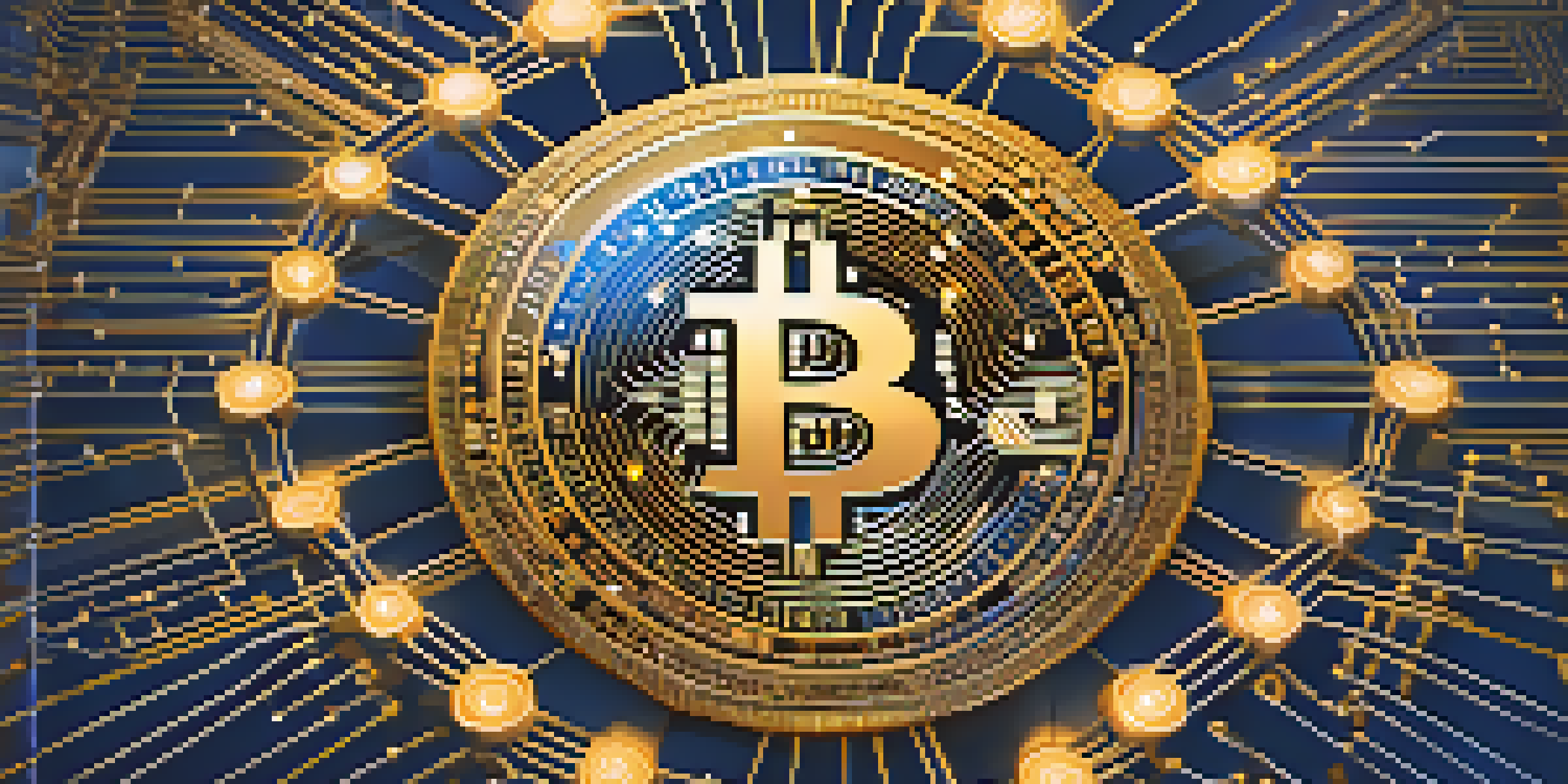Bitcoin and the Rise of Decentralized Financial Solutions

Understanding Bitcoin: A Brief Introduction
Bitcoin, introduced in 2009 by an anonymous figure named Satoshi Nakamoto, is the first decentralized cryptocurrency. Unlike traditional currencies, it operates on a technology called blockchain, which ensures that all transactions are secure and transparent. This decentralized nature means there’s no central authority, like a bank, controlling it.
Bitcoin is a technological tour de force.
Imagine a digital ledger that everyone can see, but no single person can alter. That’s essentially what the blockchain is—a public record of all transactions. This transparency helps build trust among users, as everyone can verify their transactions independently.
As Bitcoin gained popularity, it inspired a wave of new cryptocurrencies and blockchain applications, each aiming to harness the power of decentralization. This innovation laid the groundwork for what we now call decentralized finance, or DeFi, transforming the financial landscape.
What is Decentralized Finance (DeFi)?
Decentralized Finance, often referred to as DeFi, encompasses a range of financial services that operate without traditional intermediaries like banks. Utilizing blockchain technology, DeFi platforms allow users to lend, borrow, trade, and earn interest on their assets directly, all while maintaining control over their funds.

Picture a marketplace where you can trade goods without needing a cashier or store manager—this is similar to how DeFi operates. Smart contracts, which are self-executing contracts with the terms of the agreement written into code, facilitate transactions automatically, ensuring transparency and efficiency.
Bitcoin and Blockchain Basics
Bitcoin, the first decentralized cryptocurrency, operates on blockchain technology, ensuring secure and transparent transactions.
By removing intermediaries, DeFi promotes inclusivity, offering financial services to anyone with an internet connection. This democratization of finance is one of the key reasons behind the rapid growth and adoption of DeFi solutions.
The Role of Smart Contracts in DeFi
Smart contracts are a cornerstone of decentralized finance, serving as the automated facilitators of transactions. These contracts execute predefined actions when certain conditions are met, eliminating the need for a middleman. For example, if you want to borrow funds, a smart contract can automatically transfer the loan once you provide the required collateral.
DeFi is the future of finance, and it is being built today.
Think of smart contracts like a vending machine: you insert your money, select your item, and the machine delivers it without needing human intervention. This automation minimizes the risk of fraud and enhances transaction speed, making DeFi platforms more efficient.
As more developers create and deploy smart contracts, the DeFi ecosystem expands, offering innovative products like decentralized exchanges (DEXs) and yield farming platforms. These advancements illustrate how smart contracts are revolutionizing financial transactions.
Benefits of Decentralized Financial Solutions
DeFi offers numerous advantages over traditional finance, including increased accessibility and lower costs. Since there are no banks or other intermediaries involved, users can often enjoy lower fees and faster transactions, making financial services more affordable.
Imagine being able to send money across the globe in seconds without hefty bank fees—this is one of the many possibilities DeFi provides. Additionally, users can access a wider range of financial products without the limitations imposed by traditional institutions.
DeFi's Financial Revolution
Decentralized Finance (DeFi) eliminates intermediaries, allowing users to manage their finances directly, promoting inclusivity and lower costs.
Moreover, DeFi empowers individuals with greater control over their assets, allowing them to make decisions about their finances without relying on banks. This shift in power is reshaping the financial landscape toward a more user-centric model.
Risks and Challenges in DeFi
While decentralized finance presents exciting opportunities, it’s essential to recognize the accompanying risks. One significant concern is the potential for smart contract vulnerabilities, which can be exploited by malicious actors. If a smart contract has flaws, it could lead to significant financial losses for users.
Additionally, the lack of regulation in the DeFi space raises concerns about consumer protection. Without traditional oversight, users may find it challenging to seek recourse if something goes wrong. This absence of regulation can also lead to scams or poorly designed projects that can harm investors.
As the DeFi landscape continues to evolve, it's crucial for users to stay informed and exercise caution. Awareness of these risks can help individuals navigate the DeFi space more safely and responsibly.
The Future of Decentralized Financial Solutions
The future of DeFi looks promising, with continuous innovation and growing adoption. As more individuals and institutions embrace decentralized solutions, we can expect the development of more sophisticated financial products. This evolution could lead to a more diversified financial ecosystem, offering users a wider range of options.
Moreover, as technology advances, we might see improved security measures and user interfaces that make DeFi platforms more accessible to the average person. Imagine a world where anyone can access robust financial tools with just a few clicks—this could soon be our reality.
Smart Contracts Drive DeFi
Smart contracts automate transactions in DeFi, enhancing efficiency and minimizing fraud while expanding the ecosystem with innovative financial products.
As regulations begin to catch up with the rapid pace of innovation, we can anticipate a more mature DeFi environment. This balance between innovation and regulation could provide the stability needed for mainstream adoption, making decentralized finance a lasting fixture in our financial landscape.
How to Get Started with DeFi
Getting started with decentralized finance is easier than you might think. First, you’ll need a digital wallet that supports cryptocurrencies, as this will be your gateway to the DeFi world. Popular options include MetaMask and Trust Wallet, which allow you to securely store your assets and interact with various DeFi platforms.
Once you have a wallet set up, you can purchase cryptocurrencies like Bitcoin or Ethereum from exchanges such as Coinbase or Binance. With your crypto ready, you can explore DeFi platforms and begin lending, borrowing, or trading assets—all without needing traditional banks.

However, it’s essential to do your research and understand the risks involved before diving in. Many platforms offer tutorials and community forums to help new users navigate the space, ensuring that you make informed decisions as you embark on your DeFi journey.